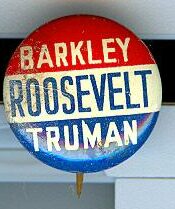Alben Barkley
Alben Barkley (November 24, 1877 – April 30, 1956) was a Democratic politician from Kentucky, who served in the House and Senate, became Senate Majority Leader, and was elected Vice President of the United States on Harry Truman's ticket in 1948.
Early life and career
Barkley was born Willie Alben Barkley in a log cabin near Lowes, Graves County, Kentucky. His parents, John Wilson Barkley and Electra Eliza (Smith) Barkley, were tenant farmers who were very religious. He graduated from Marvin College, in Kentucky in 1897, where he excelled in speech and debate. He graduated Emory College, in Georgia in 1900, and then attended the University of Virginia Law School. It was during this time that he legally changed his name from "Willie Alben" to "Alben William."
Barkley was admitted to the bar in 1901 and practiced in Paducah, Kentucky. He was prosecuting attorney for McCracken County from 1905 to 1909 and judge of McCracken County Court from 1909 to 1913. He built a reputation as a progressive who sided with the farmers more than the townspeople. He supported prohibition and opposed gambling, two major issues of the day. His energetic, folksy campaigning and strong oratorical skills made him a power in the local Democratic party, as he defeated three opponents in the 1912 primary election and won the Congressional election.[1]
Congressional career
House of Representatives
Barkley was elected to the Sixty-third and to the six succeeding Congresses (1913 - 1927) representing Kentucky's 1st district in the west. He gained statewide stature by leading the anti-gambling crusade, in cooperation with Protestant ministers. Barkley nearly secured the Democratic gubernatorial nomination in 1923, and he built a base that carried the Democratic primary for Senate in 1926.
U.S. Senator
Barkley was elected to the U.S. Senate in 1926, and was reelected in 1932, 1938, and 1944. He served from 1927 until he became Vice President in 1949.
In 1937 he defeated Pat Harrison of Mississippi for Senate Majority Leader by 38-37, by stressing his loyalty to Franklin D. Roosevelt, especially on the Court Packing proposal of 1937. His most critical election came in the 1938 primary when he defended the New Deal against conservative Gov. Happy Chandler. After a bitter campaign, Barkley won with 56% of the vote, drawing his support from farmers and workers, while the middle class voted against him.
He was [Senate majority leader from 1937 to 1947 and minority leader from 1947 to 1949. He broke with Roosevelt in 1944 on tax issues. When Roosevelt vetoed a tax bill because the rates were too low, Barkley resigned his leadership position, and called for an over-ride. The veto was overridden and Barkley was unanimously returned as Majority Leader, clearly demonstrating that he, not the President, controlled the Senate.
Vice President
President Harry S. Truman, an old Senate friend from a neighboring state, picked Barkley as his running mate in 1948. Pundits were stunned when Truman won. They were inaugurated January 20, 1949. Barkley was 71 years old, the oldest vice president to date. He handled ceremonial roles but was seldom consulted by Truman or his old Senate mates. In 1949, he returned to his alma mater, Emory University, to receive an LL.D. degree and deliver the commencement address, an occasion which became the first Emory event ever televised.
Barkley was awarded the Congressional Gold Medal in 1949. Barkley is also the only vice president to marry while in office; in 1953 he married a widow half his age.
1952 Presidential Campaign
Truman gave up his reelection campaign in 1952 after losing the New Hampshire primary, opening the way for Barkley, who wanted to run but was not able to build enough support from crucial factions in the party such as labor. He lost the Democratic nomination to Adlai Stevenson.
Return to the Senate
He was again elected to the United States Senate and served from 1955 until his death the following year of a heart attack while giving a speech at the 1956 Mock Convention held at Washington and Lee University in Virginia. He died moments after declaring, "I would rather be a servant in the House of the Lord than to sit in the seats of the mighty." He was interred in Mount Kenton Cemetery, on Lone Oak Road, near Paducah, Kentucky. In his honor, the award-winning debating society at Emory University was renamed the "Barkley Forum" in 1950. Lake Barkley, a man-made lake on the Cumberland River at the Kentucky-Tennessee border, and Barkley Dam at the same lake, are also named in his honor.
Bibliography
Primary sources
- Alben Barkley, That Reminds Me (1954), autobiography
- Jane R. Barkley, I Married the Veep (1958), memoir
Secondary sources
- Davis, Polly. "Court Reform and Alben W. Barkley's Election as Majority Leader". Southern Quarterly 1976 15(1): 15-31.
- Davis, Polly Ann. "Alben W. Barkley's Public Career in 1944". Filson Club History Quarterly 1977 51(2): 143-157.
- Hixson, Walter L. "The 1938 Kentucky Senate Election: Alben W. Barkley, 'Happy' Chandler, and the New Deal". Register of the Kentucky Historical Society 1982 80(3): 309-329.
- Libbey, James K. Dear Alben: Mr. Barkley of Kentucky (1979), 110 page biography
- Libbey, James K. "Alben Barkley's Rise from Courthouse to Congress" Register of the Kentucky Historical Society (2000) 98(3): 261-278.
- Robinson, George W. "Alben Barkley and the 1944 Tax Veto". Register of the Kentucky Historical Society (1969) 67(3): 197-210.
- Sexton, Robert F. "The Crusade Against Pari-mutuel Gambling in Kentucky: a Study of Southern Progressivism in the 1920's" Filson Club History Quarterly 1976 50(1): 47-57.
Footnotes
- ↑ Libbey (2000)
